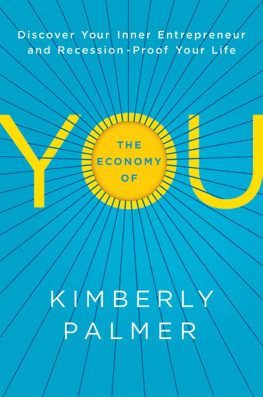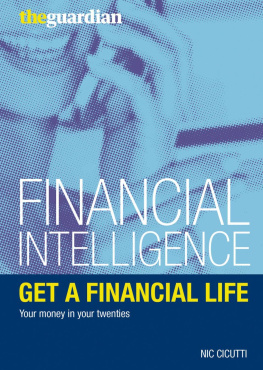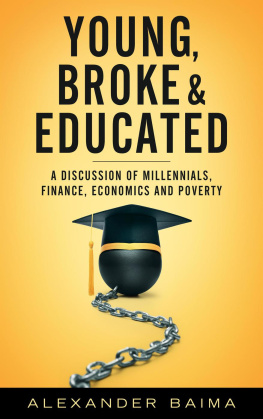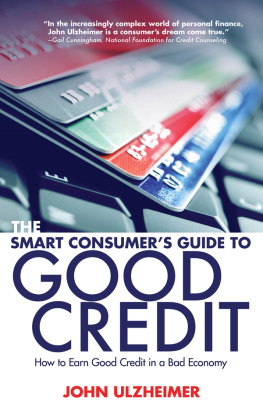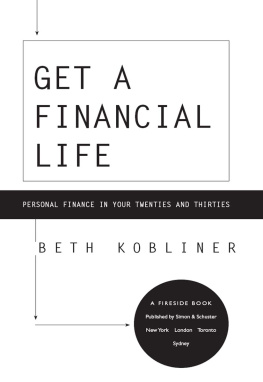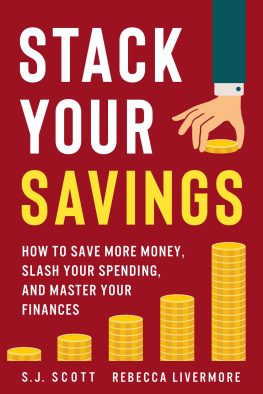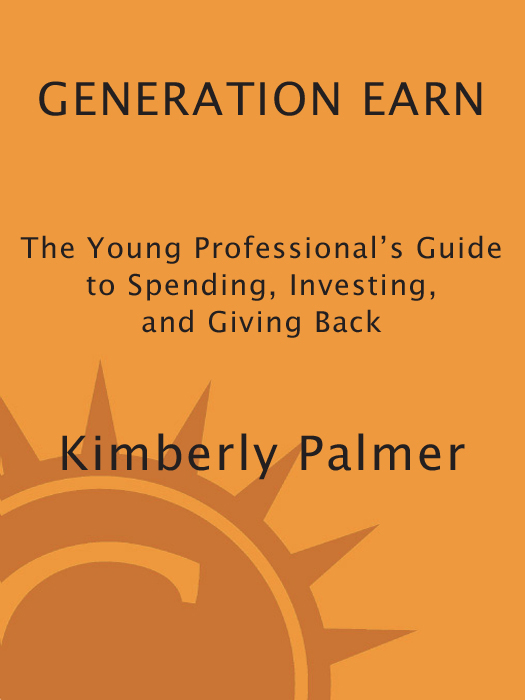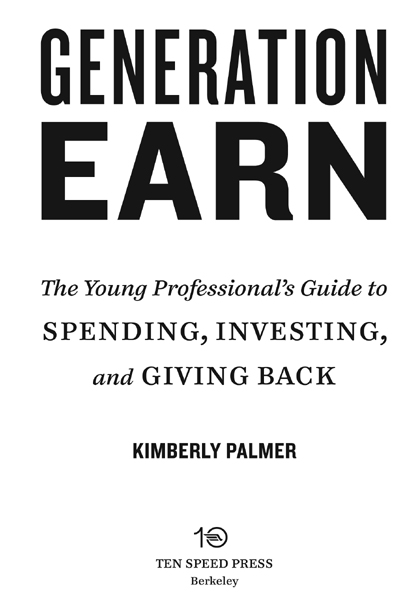Copyright 2010 by Kimberly Palmer
All rights reserved.
Published in the United States by Ten Speed Press, an imprint of the Crown Publishing Group, a division of Random House, Inc., New York.
www.crownpublishing.com
www.tenspeed.com
Ten Speed Press and the Ten Speed Press colophon are registered trademarks of Random House, Inc.
Library of Congress Cataloging-in-Publication Data
Palmer, Kimberly.
Generation earn : the young professionals guide to spending, investing, and giving back / by Kimberly Palmer. 1st ed.
p. cm.
Summary: Personal finance columnist Kimberly Palmer gives up-and-coming young professionals, who are tired of being referred to as generation debt, smart advice that bolsters their financial goals for themselves, their budding families, and the global communityProvided by publisher.
1. Professional employeesFinance, Personal. 2. Young adultsFinance, Personal. 3. Finance, Personal. I. Title.
HG179.P1886 2010
332.024dc22
2010008797
eISBN: 978-1-58008-625-7
v3.1
For Sujay and Kareena
Contents
Acknowledgments
First, I give my thanks to everyone quoted in this book who shared their stories and experiences so openly with me. By walking me through your intimate decision-making processes, lessons learned, and concerns, you helped turn otherwise-dry personal finance topics into something much more interesting, and you made the process of writing this book much more enjoyable for me.
My agent, Melissa Sarver, provided the energy, enthusiasm, feedback, and support that made this book possible. My editor at Ten Speed Press, Lisa Westmoreland, also gave invaluable guidance. Thanks also to my publicist, Kara Van de Water.
I would also like to thank the editors and mentors who have helped me since I first started in journalism, including Jim Bock, Nik Deogun, Peggy Engel, Peggy Hackman, Anne Laurent, Jim Pethokoukis, and Tom Shoop. I am also so appreciative of the support of my colleagues at US News & World Report, especially Emily Brandon, Kim Castro, Katy Marquardt, Tim Smart, and Liz Wolgemuth. Many thanks to my friends and family members who provided their expertise and feedback on early drafts, especially Tom Biggins, Alison Comfort, Nilay Dav, Ned Friend, Catherine Hirschman, Pegg Hoffman, Claire Moodie, Hayley Rohn-Dav, and Karen Rutzick.
My parents, Chris Palmer and Gail Shearer, and my sisters, Christina and Jennifer Palmer, gave me constant support, both personal and professional, as I worked on this book and throughout my entire life, for which I am infinitely grateful.
By some fluke of timing, my baby and this book shared the same due date. Meeting both deadlines was only possible with the constant and endless support of my husband, Sujay Dav. Not only did he listen and give me feedback as I read much of the book out loud to him during car trips but he also made the entire process of getting ready for a baby and writing a book as fun and relaxing as it could possibly be.
Introduction: Meet the New Young Professional
As the twenty-first century began, journalists and financial advisers began throwing around a new term to describe the current group of young people: Generation Debt. This term evoked slackers who lacked their grandparents sense of financial responsibilityinstead of saving for a rainy day, they wasted their money on lattes, iPods, and takeout. These people were made to seem as though they lived off credit cards, student loans, and whatever help their parents could send their way.
This mythical tribe soon had its own spokespeople and leaders. Reporters found scores of young professionals caught up in spiraling credit card debt willing to dish about the forces that had created their mess. In response, popular books advocated eating ramen and reusing popcorn bags to get free refills at the movies.
Pundits used these kinds of examples in order to justify an increasingly condescending attitude about our financial aptitude. On the Fox Business Network, Beth Kobliner, author of the best-seller Get a Financial Life, said that even Ivy League college students graduate without understanding how to pay for everyday expenses. She recalled one student who asked her how to take out a loan to rent an apartment, and she had to explain that people use income, not loans, to pay their rent. Basic, basic concepts they just dont know about money, she said.
The term generation debt stuck because there is some truth to it. Two out of three college students now take out student loans, compared to less than half in 1993.
But most of us are not letting our debts define us. While student loan burdens are heavier than they were in generations past, more of us have college and advanced degrees that give us greater earning power. The number of people enrolled in graduate programs has increased over 70 percent since 1976, making Generations X and Y the most highly educated group of Americans to date.
As for credit cards, only one in three college students carries one at all. This is true even though many of us experienced two recessions before reaching mid-career, first when the tech bubble burst in 2001 and then when the subprime mortgage crisis led to housing market collapses and bank failures in 2008 and 2009.
However, all these facts and figures dont quite capture the Zeitgeist of our generation. Few would mistake us for self-satisfied Alex P. Keaton types, reaping the bounties of capitalism. The popping of the tech bubble and the subprime mortgage crisis underscored the importance of sacrifice and hard work and made it clear how hard it can be to get ahead. Nor are we purely do-gooderscollege kids canvassing for their political idols. We are something in between. We want to own nice homes, feel financially successful, support our families, one day send our kids to college, and change the world at the same time.
Although we may now have some money to invest, our goals involve far more than just becoming rich. The financial crisis of 2008 dovetailed with a growing interest in sustainability, simplicity, and even frugality. Instead of living exclusively for our own pleasures, we have embraced a new level of social consciousness. We care about the environment, our cities, and social justice. Many of us also want kids, and, thanks in part to loud warnings about the decline of fertility with age, we arent putting that off forever, either.
As the Alpha Consumer blogger and columnist for US News & World Report, I frequently receive questions from readers about navigating this terrain: What should I be doing with my savings? Where should I invest my money? Can I afford to buy a house, or should I keep renting? Does it make sense to share a mortgage with my boyfriend? Can I afford a baby? How can I support the causes I believe in? As a young professional myself, I have many of the same concerns.
This book explores those questions and gives you tools to help you make the best decisions for your situation. It explains how to improve your bank account as well as how to get closer to reaching your bigger financial ambitions, from living debt free to saving for a childs future college education. It looks at how to manage money in relationships, both before and during marriage. It asks when it makes sense to accept financial aid from parents, and how to handle requests for assistance from other family members. It will help you decide whether youre ready to buy a house, have a baby, or take a break from your career. It also explains how to make an impact on the world with your money and resources, whether that means starting a nonprofit or spending and investing in a way that supports your values.


